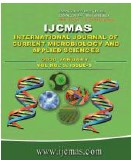


 National Academy of Agricultural Sciences (NAAS)
National Academy of Agricultural Sciences (NAAS)

|
PRINT ISSN : 2319-7692
Online ISSN : 2319-7706 Issues : 12 per year Publisher : Excellent Publishers Email : editorijcmas@gmail.com / submit@ijcmas.com Editor-in-chief: Dr.M.Prakash Index Copernicus ICV 2018: 95.39 NAAS RATING 2020: 5.38 |
Hand washing prevents the transmission of infections including waterborne, parasitic and nosocomial infections. Hand washing is the most effective and cheaper method of preventing the spread of germs. The main aim of the study is to evaluate the knowledge, attitude, behavior and practice of hand washing among the heterogeneous population including Doctors, Nurses, Medical students, Para-medical staffs, Non-Medical students, School children and mothers of under-five in Tiruchirappalli, Tamilnadu. Method of study is cross-sectional study, study conducted for 2 months from June-August 2015. Among the 400 participants, 10% doctors, 7.5% nurses, 25% medical students, 7.5% Para-medical staffs, 25% Non-medical students, 12.5% school children and 12.5% mothers of under-five were participated. The data were analyzed and found that the knowledge among doctors, nurses, medical students, Para-medical staffs, Non-medical students, school children and mothers was 64.5%, 58.8%, 50.7%, 57.6%, 38.28%, 49.3% and 39.5% respectively. The attitude among doctors, nurses, medical students, Para-medical staffs, Non-medical students, school children and mothers was 95.7%, 72.8%, 89.1%, 52.2%, 83%, 82.4% and 63.1% respectively. The practice of hand washing among, nurses, medical students, Para-medical staffs, Non-medical students, school children and mothers was 63.1%, 51.6%, 51.6%, 51.2%, 44.2%, 44% and 45% respectively. For medical professionals it is mandatory to wash hands before and after touching patients and after handling infectious materials but this survey didn’t reveal the expected results from the healthcare professionals and others. Hence the hand washing procedures should be included in the curriculum from the elementary level to higher level.
 |
 |
 |
 |
 |